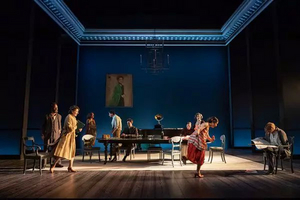Review Roundup: Tom Stoppard's LEOPOLDSTADT Opens at Wyndham's Theatre
|

Tom Stoppard's Leopoldstadt opens tonight at the Wyndham's Theatre.
The adult cast comprises Sebastian Armesto, Jenna Augen, Rhys Bailey, Faye Castelow, Joe Coen, Felicity Davidson, Mark Edel-Hunt, Clara Francis, Ilan Galkoff, Caroline Gruber, Sam Hoare, Natalie Law, Avye Leventis Noof McEwan, Dorothea Myer-Bennett, Jake Neads, Aaron Neil, Alexander Newland, Yasmin Paige, Adrian Scarborough, Sadie Shimmin, Griffin Stevens, Ed Stoppard, Luke Thallon, Eleanor Wyld and Alexis Zegerman.
The children's cast comprises Jarlan Bogolubov, Toby Cohen, Zachary Cohen, Olivia Festinger, Tamar Laniado, Maya Larholm, Daniel Lawson, Louis Levy, Libby Lewis, Jack Meredith, Chloe Raphael, Beatrice Rapstone, Ramsay Robertson, Montague Rapstone and Joshua Schneider comprising three sets of five children.
Set designs are by Richard Hudson, with costume designs by Brigitte Reiffenstuel, lighting by Neil Austin, sound and original music by Adam Cork, and movement by EJ Boyle. Casting is by Amy Ball CDG, with children's casting by Verity Naughton.
Vienna in 1900 was the most vibrant city in Europe, humming with artistic and intellectual excitement and a genius for enjoying life. A tenth of the population were Jews. A generation earlier they had been granted full civil rights by the Emperor, Franz Josef. Consequently, hundreds of thousands fled from the Pale and the pogroms in the East and many found sanctuary in the crowded tenements of the old Jewish quarter, Leopoldstadt.
Tom Stoppard's new play, directed by Patrick Marber, is an intimate drama with an epic sweep; the story of a family who made good. "My grandfather wore a caftan," says Hermann, a factory owner, "my father went to the opera in a top hat, and I have the singers to dinner." It was not to last. Over the next fifty years this family, like millions of others, was to re-discover what it meant to be Jewish in the first half of the 20th century. Leopoldstadt is a passionate drama of love, endurance and loss. It is Stoppard's most humane and heart-breaking play.
Ben Brantley. The New York Times: More than any previous Stoppard play - including the sprawling "Coast of Utopia" trilogy, a 9-hour dive into the Russian Revolution - "Leopoldstadt" is a group portrait, and one of uncommon density. (You will probably feel the need to consult the family tree in the program.) The 40-strong cast is, to a person, very good, and they embody their characters with spiky defining detail. That they threaten to get lost in the play's panoramic sweep is partly the point here. But it is also hard to avoid the impression that they exist as illustrative figures in an admonitory history lesson. There's no denying that lesson's emotional power, nor its frightening relevance in 2020, when anti-Semitic acts and language seem increasingly on the rise.
Marianka Swain: BroadwayWorld: Stick with the play's heftier sections, because the second half grips hold of you and demands you bear witness. It is stark, simply told, and unbearably moving. At the beginning of the play, matriarch Emilia spoke of how forgetting the names of those in old photograph albums equated to something like a second death. The Merz family, and so many millions of others lost to the genocide of the Holocaust, cannot be saved, but they must never be forgotten. Stoppard's work here ensures that.
Arifa Akbar, The Guardian: The cast is so large that some characters feel scantily sketched although Hermann (Adrian Scarborough) is particularly well-drawn alongside his wife, Gretl (Faye Castelow). When there is drama rather than debate, it is arresting - such as a powerful house repossession scene and an infidelity that has long-term consequences. The off-stage action has a searing effect thanks to Adam Cork's sound design, from the smashing of glass that signifies Kristallnacht to the screeching of fighter planes and stomping of boots.
Tim Bano, The Stage: Leopoldstadt might be Stoppard's late eureka moment: that you understand the human condition not by writing about anything - everything - else, but precisely by writing about the human condition. "The one thing I feel I've learnt over the years", he said in a recent interview, "is that the story has got to work emotionally, not simply as an exercise in ingenuity." Whatever has been said of Stoppard's work in the past, very little of it applies to Leopoldstadt. The play is personal, linked closely to his own family history. It is simple, following one family over five decades. And it is deeply, achingly moving.
Dominic Cavendish, The Telegraph: After an overwrought first act, Stoppard brings everything to an unforgettable theatrical climax in the second. Luke Thallon, brittle and thoroughly British, plays Leo, Hermann's great nephew but also a veiled version of the author, trying circa 1955 (as Stoppard did, later) to find out what became of his family. This youth who was rescued and raised in the UK changed his name from Leopold to Leonard and he weeps when confronted by the loss that entails. The author has said he cried watching these scenes, and I'm not surprised. People have sometimes accused him of being too clever by half, lacking the power to move us beyond words; here is irrefutable evidence to the contrary.
Videos
